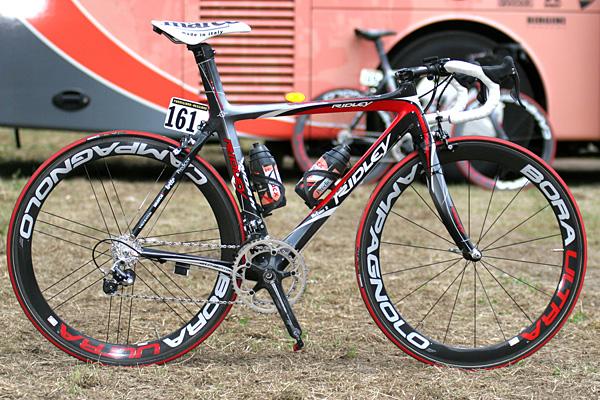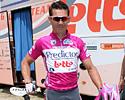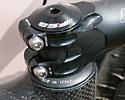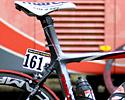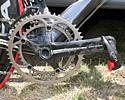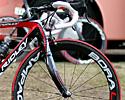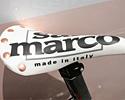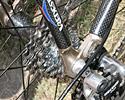
Recently on Cyclingnews.com |
Pro bikes, May 31, 2007
Robbie McEwen's Predictor-Lotto Ridley Noah
Sprinting machineBy Shane Stokes While Robbie McEwen is very much a born and bred Aussie, he has integrated well into Belgian culture and has a strong fan base there. He speaks the lingo, spends a lot of time in the country and, importantly, is a very successful bike rider, which is always a good thing for the cycling-mad Flemish. Moreover, the 34-year-old races for the Belgian Predictor-Lotto team and also rides a Belgian bike, the Ridley Noah. McEwen debuted the new machine at last year's Tour de France and wasted no time in racking up a few victories, including three stage wins and his third maillot vert there, as well as victory in Paris-Brussels later that year. McEwen has continued his winning ways this season, getting things underway with stage wins in the Jacob's Creek Tour Down Under, Tirreno Adriatico, and the Tour of Romandie, plus a second-place finish in the Scheldeprijs Vlaanderen, fourth in Milan-San Remo, and sixth in Gent Wevelgem. McEwen followed his usual pattern and pulled out of this year's Giro d'Italia halfway through, preferring to follow his traditional build up to what he hopes is going to be another successful Tour de France campaign, but not before he accumulated a few Italian souvenirs. McEwen took home a Stage 2 sprint victory over Alessandro Petacchi (Team Milram) and Paolo Bettini (Quickstep-Innergetic) as well as additional Giro placings of 2nd, 3rd, 4th and 5th. As a pure sprinter, McEwen's main requirement of his bike is stiffness rather than weight savings, and indeed, one of Ridley's primary design goals for the Noah was maximising frame rigidity. Like its predecessor, the Damocles, the Noah utilizes a tapered 1 ⅛" (top) to 1 ½" (bottom) steerer tube for precise handling. However, the Noah also features revised front end shaping and a ‘switching triangular form' down tube for additional torsional rigidity, a stiffer carbon fiber content, and a newly integrated seatmast with a deep-section profile throughout its length for improved drivetrain response as well as enhanced aerodynamics. Rear dropouts are also wholly replaceable and are CNC-machined from titanium, rather than aluminium. That integrated seatpost requires careful measuring, of course, but some adjustment is possible via the CNC-machined double-position seat clamp, which is also equipped with micro-spacers, and a millimetre indicator for fine-tuning the saddle height. Curiously, McEwen swaps the standard straight-bladed carbon fork for the curved-leg one used on Ridley's Helium and Excalibur models. According to David Alvarez of Ridley, "Robbie feels that the curved fork gives a little more comfort, even if our tests show it has the same stiffness as the straight fork. But you know pro riders!" Ridley claims the Noah clocks in at 1.29kg (our small-sized tester was slightly over at 1.38kg), which is a couple of hundred grams heavier than some other ProTour team frames. However, that figure also includes the integrated seatpost, and the fact that McEwen's overall bike weight is just 7.2kg with a fairly standard build provides plenty of evidence that the frame can easily yield a suitably light machine by nearly anyone's standards. In terms of componentry, the Predictor-Lotto team bike is kitted out with Campagnolo Record, including the Ultra-Torque bottom bracket and chainset. Surprisingly, McEwen opts for 170mm cranks, although this probably gels well with his high cadence sprinting. On the day in question he had 53/39T gearing up front running with 11-23T sprockets. The wheelset is Campagnolo's 1305g Bora Ultra hoops, mated with Vredestein Fortezza Pro Tricomp tubulars. Cockpit components are supplied by team sponsor FSA, including the aluminium Energy T (traditional bend) handlebar and OS-115 stem with carbon fiber face plate. Other contact points consist of Look Keo pedals and a Selle San Marco saddle. The bike is finished off with Tacx Tao Carbon bottle cages and a Cateye Strada computer, with maximum speed being clearly the most important function on the latter. PhotosFor a thumbnail gallery of these images, click here Images by Shane Stokes/Cyclingnews.com
| |||||
Full specificationFrame: Ridley Noah high-modulus carbon fibre Critical measurements Bottom bracket: Campagnolo Record Ultra-Torque |
Wheelset: Campagnolo Bora Ultra Bars: FSA Energy T Pedals: Look Keo Total bike weight: 7.2kg (15.9lb) | ||||

